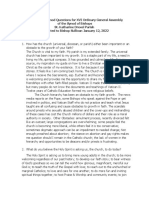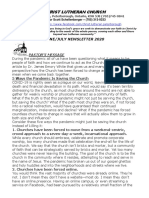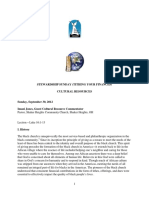Radical Reformation Revisited VI July-December 2011 I. The Deconstruction
Radical Reformation Revisited VI July-December 2011 I. The Deconstruction
Uploaded by
Dena WilliamsCopyright:
Available Formats
Radical Reformation Revisited VI July-December 2011 I. The Deconstruction
Radical Reformation Revisited VI July-December 2011 I. The Deconstruction
Uploaded by
Dena WilliamsOriginal Description:
Original Title
Copyright
Available Formats
Share this document
Did you find this document useful?
Is this content inappropriate?
Copyright:
Available Formats
Radical Reformation Revisited VI July-December 2011 I. The Deconstruction
Radical Reformation Revisited VI July-December 2011 I. The Deconstruction
Uploaded by
Dena WilliamsCopyright:
Available Formats
1 Radical Reformation Revisited VI JulyDecember 2011 I. The Deconstruction It is time for Protestant Christian denominations to reform or die.
I will preach at the closing of our congregation this Sunday and the advice I gave my people over the last year is excellent advice for the greater church as well. Radical reformation or closure needs to happen sooner rather than later. The longer a denomination or congregation circles the drain, the more the institutions freedom of choice diminishes. A timely decision for dramatic change or closure prevents ensuing overwhelming chaos. The opportunity to leave a meaningful legacy or decisively redirect a ministry is available for a very small window of time. There are two facets of Christian congregations that are most in need of reform. Congregations spend the vast majority of their financial resources in two areas: the cost of professional clergy and the cost of buying and maintaining church buildings. These costs are a result of human design throughout the history of Christianity. There is no meaningful Scriptural support for paid professional clergy or mortgage holding for the purposes of Christian worship and community. The foundational theological understanding that the church exists solely for the sake of the world must be proclaimed in order for radical reformation to take place. It is no small task to teach pastors and lay people that the only part of ministry Jesus has any real interest in celebrating with us is that which serves the needs of the least of the brothers and sisters in our communities and across the world. Worship, education, and fellowship activities are only important in as much as they support and encourage ministry on behalf of the world, ministry that builds the Kingdom of God.
2 Few congregations possess the resources and desire to radically reform their ministry. Congregations in changing neighborhoods are unwilling or unable to spend the funds and energy necessary to provide worship and activities in a language other than English. Congregations in the inner city are unwilling to search out opportunities and seek financing to provide support for the people around them who live in poverty. Congregations in rural areas and nearby small towns are unwilling to unite to reduce costs in order to provide resources for the uncertainties of agriculturally based communities. Congregations in the suburbs are unwilling to focus ministry on the needs of the world beyond the borders of their community. The church is no different than any other institution when it comes to resistance to changethere exists no desire to take risks or shift focus. The truth unrecognized by institutions is thisreform or die. II. The Death We made efforts to reform. Roadblocks aroseaging bodies, a fair weather pastor, hierarchical barriers, broken trust. Visions came and evaporated. Synod structures proved unable or unwilling to support and encourage a rebirth. The congregation is closed now. The building is sold to Buddhists who will use it as a cultural center. The crosses are removed, except for the ones worked in cement in the bricks, the iron one on the roof, and the shadow of one formed in the chancel where candle smoke darkened the bricks around the shape that hung there. The brass altar ware, the candle sticks, offering plates, processional cross, the paraments and linens, chalice and paten, stained glass, red hymnals and green Bibles, the enormous painting of Jesus in Gethsemane, the Paschal candle, and the fontall are gone. The people are gone as well. Some worshipped with area congregations this morning. Some, like me, worshipped nowhere. Some will find a church community eventually;
3 some will not. The squirrels still dance along the windowsills and scamper across the roof. The playground is silent. The child care center is desertedonly remnants remaina broken brown crayon, a lost red mitten, a sticky popsicle wrapper. The lawn still green and groomed; the flowering crab in full summer foliage. The marquee announces, He is risen!, Sunday Worship 10:15am. Someone ought to remove the letters, but who is left to do that? The Bishop came last Sunday afternoon. 150 people attended closing worship. The liturgy began with prayers, then hymns, Scripture, preaching, the peace, the offertory, the Agnus Dei, Holy Communion, dispersal of over $600,000 in assets, and the declaration of closing and the leave taking. A reception followed. The cake read, Ending with Hope, Alleluia!. The congregation closed in timethe people controlled the dispersal of assets, made certain furnishings and finances went to the least of the brothers and sisters here and around the world. There was time to talk about where to go next, time to grieve, time to remember, give thanks, and celebrate 63 years of ministry on this corner. There was no grand reformation, only a death, a timely death, but still a death.
Water splashes, bread breaks, wine flows. Words are spoken, hymns sung. Where will they find gracious community again? Where will I? III. The Reform Church for the Sake of the World is my vision under development. I am an affluent baby boomer nearing retirement. I do not need or want trappings. I want to worship with a smallish community that does not own or maintain a building, does not pay a professional clergy person, and sends all contributions out into the world to
4 build the Kingdom. The musicians, preachers, teachers, and all staff are volunteers. There are no bills to pay. Everyone contributes their presence at worship and any other activities of interest organized by the congregation. Everyone contributes financially as he or she is able knowing that all funds are dispersed to the last, the least, and the lost. If someone in the congregation is or becomes one of the last, the least, and the lost, he or she is assisted in the most helpful and practical ways the community can provide. Everyone contributes whatever gifts or graces God has providedmusic, worship leadership, teaching, keeping the books, coordinating communications, space for worship and other activities, counseling, pastoral care, mentorship, etc. Decisions are made by consensus in the communitythere is no hierarchy and only as much organization as is necessary to be in community in order to serve the world effectively. Affiliation with a denomination might happen, but only with the full affirmation of the people. All funds are dispersed globally, domestically, and locally for the benefit of those who lack basic human needs. Systemic progress is also encouraged through activism and the support of educational institutions and individual educational endeavors. Worship happens once a week, probably in someones living room where keyboard or piano is available. The liturgy is simple but meaningful. The worship materials are inexpensive and accessible. There is singing. There is reading of Scripture. There is preaching. There is prayer. There is Eucharist. There are baptisms. If there are one or more professional clergy people in the community, he or she or they share their expertise by leading and preaching and teaching but also by empowering others in the community to do the same. Opportunities for education, fellowship, and hands-on service are made available as the community decides.
5 Church for the Sake of the World may need non-profit status in order to collect funds and provide tax credit to givers, but no debt is accrued, there are no bills to pay, no salaries to maintain, no property or furnishings are owned. This model is mineits not for everyone! Others treasure and serve passionately in traditional church communities, thanks be to God! Perhaps this is a vision of emerging church for baby boomersa worshipping community where we come together to be the body of Christ to the world nothing more, nothing less. IV. The Reality My denomination met in national assembly this summer. I watched as much of the video as I could tolerate. Many hours were spent establishing rules, explaining procedures, getting ready to get ready. It was tedious and painful, even on video. I never, ever want to be a delegate to this assembly. According to a bulletin insert available for congregational use, the assembly boasts six accomplishments: Malaria Campaign officially launched Genetics, Faith and Responsibility social statement adopted Review process for social statements adopted Living into the Future Together implementing resolutions adopted 2012-2013 Budget proposals adopted Memorials and constitutional changes adopted The first item (malaria) will benefit the last, the least, and the lost. It is representative of the church at work for the sake of the world. The second item (social statement on genetics) might benefit someone, somewhere, some time in the world. The last four items focus on internal, institutional, hierarchical concerns. No one in need, anywhere, in any
6 time or place is likely to benefit from these actions. Really. That Living into the Future Together thing? I read it. It is very long. It is very, very short on a vision for a church that exists solely for the sake of the world. The report reflects serious concern for the survival of the institution. I am looking for a new congregation where I can worship and serve as a member. I visited one about 15 minutes from home three weeks ago. Here is the letter I wrote to send to the president of the congregation: August 21, 2011 Dear Friend, I visited worship on Sunday, August 14. I am sharing my impressions. I hope they will be received in the spirit in which they are intendedone of concern for the Body of Christ. My list may seem harsh, but please know I only want to help the congregation learn how they might be more welcoming. --Your website is excellentwelcoming and warm and informative! It is extremely well written. There is focus on the call to welcome and serve those all people. --I was surprised to find the steps and courtyard covered with sticks and leaves. It would be easy to sweep it on Sundaysa clean entrance is much more welcoming. --I was not greeted or handed a bulletin when I arrived at 9:45. I went to a pew and left my purse, then returned to the back to find a bulletin. --Worship began with the confession. There were no words of greeting. The pastor did not introduce himself. A warmer beginning might be helpful.
7 --The offertory was quite long and contributed to a really long worship hour. --The sermon was also quite long24 minutes. I was disappointed that the childrens sermon was not particularly child friendlyperhaps a warmer approach with simpler language by a lay person, a teacher, would be better. --Using Now the Feast in its entirety, including acclamations, etc. lengthens worship as well. It is an unusually long liturgy but can be effectively shortened. --One person said, Welcome to me during the peace. Perhaps a time at the beginning of worship when all those present are invited to look around, spot someone they dont know, and given a couple minutes to greet that person would be helpful. This would also warm up the opening of worship. Folks can say that they look forward to more conversation during coffee time and that they hope the visitor/unknown person will stay. People have to be taught how to provide hospitality, but if they know what to say and do, they usually get comfortable greeting others. --I know some congregations place announcements in the middle of worship, but I find this interrupts the flow in distracting ways. Different pastors though have different opinions and preferences. I prefer announcements at the beginning, as a part of a warm welcome. Then the liturgy of worship is not interrupted. Other pastors prefer announcements at the end (not my preference) so that worship is not broken. --Thanks be to You can serve as the sending hymn. Adding an additional hymn again lengthened worship. I left after 90 minutes, as the last hymn began. --I completed the visitor slip and wrote a rather generous check for the offering. My contact information was readily available, yet I did not receive a phone call or letter or e-mail
8 of greeting following my visit. This is an easy and important piece for a congregation to address. --Some congregations even have porch visitors who take a baked good and information to the home of visitors on Sunday afternoon or Monday. They are well received because they stay on the porch and just knock and politely drop off the items. If no one is home they leave the items hanging from the doorknob with a note of explanation. I preached and presided in this congregation several times during the last interim period and enjoyed my time with the people very much. I know it can be difficult during such an interim time to keep folks engaged in providing a welcoming atmosphere. I presided at the closing of a congregation on July 24, so I am particularly sensitive to the struggles of small communities and the danger of unfocused efforts to welcome visitors. I hope Epiphany will maintain energy and enthusiasm for the sake of the Gospel. Again, please know I did not take the time to write in order to be overly critical. The congregation has wonderful potential and a fine history of ministry. Please consider this a letter of encouragement. I will remember all of you in prayer as you work toward calling a new pastor. Gods best to the people of God you serve! Sincerely, Dena Williams I was kind in my letter. I hope it encourages the president to raise important concerns about hospitality on Sunday mornings. There are some things I didnt include. The interim pastor lacks preaching skills, from form and delivery to theological content. Most important is the remarkable lack of care for the world, the neighborhood, or even a Sunday morning visitor.
9 So, this is the reality, from the distant echelons to the loneliest pew. The lack of ability or effort to even articulate, let alone live out the vision of the church that exists solely for the sake of the world, in my recent experience, is, indeed, astounding. V. The Reconstruction Hierarchical Structures Mainline Protestant denominations must reduce the overwhelming amount of resources consumed by the maintenance of enormous hierarchical structures. Why? These structures do not impact the lives of the people in the pew. They are so removed from the experience of most worshippers that should they disappear overnight many, many people would literally not notice their departure. The personnel involved, while often well intended and faithful, have absolutely nothing to do with loving relationship among members of congregations and do not impact how congregations serve the world, the neighborhood, the community, or one another. The hierarchy is so very remote, so removed that the vast majority of members have never encountered anyone on the national level and, except for perhaps hearing the Bishop or an Assistant to the Bishop preach, they are completely out-of-touch with the office staff in their synod. The only truly important role of the hierarchy is to allow the good news and resources to be shared in all the world. One other potentially important role is to teach and vet leaders for congregations. Thats itprovide a system for good news and resources to be shared with the last and least and lost around the world, and oversee the provision of leaders for congregations. The amount of financial resources needed for these two responsibilities is minimal compared with the current budget of the national church. The hierarchy works very effectively at present in the first role through World Hunger, Lutheran World Relief, and Social Service agencies. The systems for teaching and vetting leaders for congregations needs serious overhaul from the
10 geographic distribution of seminaries, the lack of long distance learning opportunities, and the eccentric practices of local committees charged with oversight. The current structure of the synod where I am rostered is absurd. The support staff of five people work very hard, taking care of the day-to-day business, arranging all communications, planning all conferences and assemblies, bookkeeping, record keeping, etc. Two of the professional staff do not live on the grounds of the synod but are flown in and housed several times a year. Not only are they therefore, largely unavailable, they do not play any role in the development of loving relationship among Gods people. It is very hard to imagine that there is no one who lives in the five state area of the synod who could assume these responsibilities. A part-time pastor? A qualified lay person? Two full-time assistants to the Bishop are responsible for mission outreach, the call process, and, well, that is all! Perhaps the Bishop could assume these responsibilities? Not a single staff meeting was held in the synod office in the last six months. This office is over staffed with professionals who, though qualified, do not seem particularly interested in their call to serve. Congregations Stay Tuned . . .
11
You might also like
- Abstract Book MinchiateDocument6 pagesAbstract Book MinchiateDrogadicto Rehabilitado80% (5)
- How Jesus Became God by Bart D. Ehrman (Excerpt)Document12 pagesHow Jesus Became God by Bart D. Ehrman (Excerpt)HarperOne (an imprint of HarperCollins)86% (14)
- Bob Jones & Paul K. Davis Shepherd's RodDocument352 pagesBob Jones & Paul K. Davis Shepherd's RodYonas Alemayehu Soressa100% (2)
- Shaping SanctuaryDocument445 pagesShaping SanctuaryReconciling Ministries NetworkNo ratings yet
- Keller Integrative MinistryDocument28 pagesKeller Integrative MinistrycoburNo ratings yet
- EnglishethiopianliturgyDocument185 pagesEnglishethiopianliturgyDebre Mewi Kidus Gabriel Rotterdam100% (1)
- The Heartbeat of God: Finding the Sacred in the Middle of EverythingFrom EverandThe Heartbeat of God: Finding the Sacred in the Middle of EverythingRating: 4 out of 5 stars4/5 (1)
- National Umra Newsletter 02 19Document9 pagesNational Umra Newsletter 02 19api-79813623No ratings yet
- SKD Synod ResponsesDocument10 pagesSKD Synod ResponsesChance BrockmanNo ratings yet
- Unit 2 CompiledDocument82 pagesUnit 2 Compiledsteph marburyNo ratings yet
- My Name Is Heretic: Reforming the Church, from Guts to GloryFrom EverandMy Name Is Heretic: Reforming the Church, from Guts to GloryNo ratings yet
- The Casa Bulletin - August 8, 2010Document10 pagesThe Casa Bulletin - August 8, 2010TheCasaFRCNo ratings yet
- Spring 2012 Trinity Seasonal NewsletterDocument6 pagesSpring 2012 Trinity Seasonal NewsletterTrinity Episcopal ChurchNo ratings yet
- Card 1 TellDocument2 pagesCard 1 Tellstarsalingsoul8000No ratings yet
- Church in Translation: Vibrant Christianity in Your Time and PlaceFrom EverandChurch in Translation: Vibrant Christianity in Your Time and PlaceNo ratings yet
- Called To Be A Listening Church Archdiocese of ReginaDocument13 pagesCalled To Be A Listening Church Archdiocese of ReginaDaniel JacksonNo ratings yet
- Since We Saw You Last: The Church, the Community and Rites of PassageFrom EverandSince We Saw You Last: The Church, the Community and Rites of PassageNo ratings yet
- First Christian Courier-October 1, 2011Document6 pagesFirst Christian Courier-October 1, 2011Dennis SandersNo ratings yet
- June-July Newsletter-2020 - FinalDocument8 pagesJune-July Newsletter-2020 - Finalapi-329478828No ratings yet
- 21 Challenges Facing The 21st Century ChurchDocument5 pages21 Challenges Facing The 21st Century ChurchJose Jonathan Advincula BitoyNo ratings yet
- Pastoral Care in the Small Membership ChurchFrom EverandPastoral Care in the Small Membership ChurchRating: 3 out of 5 stars3/5 (1)
- Everyday Evangelism for Catholics: A Practical Guide to Spreading the Faith in a Contemporary WorldFrom EverandEveryday Evangelism for Catholics: A Practical Guide to Spreading the Faith in a Contemporary WorldNo ratings yet
- Raising Your Congregational IQ: Ministry Associate With The Columbia Partnership Voice: 502. 320.4336, E-Mail: Web SiteDocument3 pagesRaising Your Congregational IQ: Ministry Associate With The Columbia Partnership Voice: 502. 320.4336, E-Mail: Web Siteapi-25949894No ratings yet
- Being Present: Ministry on the Edges of Organization, Church, and MissionFrom EverandBeing Present: Ministry on the Edges of Organization, Church, and MissionNo ratings yet
- Courage - : Ministering To Those With Same-Sex AttractionsDocument2 pagesCourage - : Ministering To Those With Same-Sex AttractionsJasonKimesNo ratings yet
- Leaning Both Ways at Once: Methodist Evangelistic Mission at the Intersection of Church and WorldFrom EverandLeaning Both Ways at Once: Methodist Evangelistic Mission at the Intersection of Church and WorldNo ratings yet
- Religion B ST PatrickDocument8 pagesReligion B ST PatrickLic Nestor ChirinosNo ratings yet
- SMS& MS Draftoverview 8sep12Document10 pagesSMS& MS Draftoverview 8sep12Paul UwemedimoNo ratings yet
- Free Range Priest: Ordained Ministry Reimagined In the 21st CenturyFrom EverandFree Range Priest: Ordained Ministry Reimagined In the 21st CenturyNo ratings yet
- Grant ProposalDocument10 pagesGrant Proposalapi-280132693No ratings yet
- Nat Umra Newsletter August 2022Document7 pagesNat Umra Newsletter August 2022api-79813623No ratings yet
- The Death of the Church and Spirituality Reborn: What is the Point of a Religion - any Religion?From EverandThe Death of the Church and Spirituality Reborn: What is the Point of a Religion - any Religion?No ratings yet
- Brett McCracken-WPS OfficeDocument14 pagesBrett McCracken-WPS Officekamba bryanNo ratings yet
- Sharing Gifts in the Global Family of Faith: One Church's ExperimentFrom EverandSharing Gifts in the Global Family of Faith: One Church's ExperimentNo ratings yet
- Where the Edge Gathers:: Building a Community of Radical InclusionFrom EverandWhere the Edge Gathers:: Building a Community of Radical InclusionRating: 3 out of 5 stars3/5 (1)
- Attract Families to Your Church and Keep Them Coming BackFrom EverandAttract Families to Your Church and Keep Them Coming BackNo ratings yet
- Contemporary IssuesDocument6 pagesContemporary Issuesferanmi oyerindeNo ratings yet
- Pentecostalism and Catholic Ecumenism In Developing Nations: West Africa as a Case Study for a Global PhenomenonFrom EverandPentecostalism and Catholic Ecumenism In Developing Nations: West Africa as a Case Study for a Global PhenomenonNo ratings yet
- A Church for All: A Guide to the Australian Plenary Council...and BeyondFrom EverandA Church for All: A Guide to the Australian Plenary Council...and BeyondNo ratings yet
- The Courage to Be Protestant: Reformation Faith in Today's WorldFrom EverandThe Courage to Be Protestant: Reformation Faith in Today's WorldRating: 5 out of 5 stars5/5 (1)
- Basic Ecclesial CommunitiesDocument5 pagesBasic Ecclesial Communitiesreybaluran07No ratings yet
- Is There Hope for the Christian Faith?: Five Hundred Years After Martin Luther, the Christian Church Is Beginning a New ReformationFrom EverandIs There Hope for the Christian Faith?: Five Hundred Years After Martin Luther, the Christian Church Is Beginning a New ReformationNo ratings yet
- Stewardship Sunday (Tithing Your Finances) Cultural ResourcesDocument10 pagesStewardship Sunday (Tithing Your Finances) Cultural ResourcesdanielNo ratings yet
- Multi-Congregation Ministry: Theology and Practice in a Changing ChurchFrom EverandMulti-Congregation Ministry: Theology and Practice in a Changing ChurchNo ratings yet
- Cottrell HermeneuticsDocument110 pagesCottrell HermeneuticsDzuhry Dzulkarnain100% (1)
- The Unique Role of The Local Church in Developing A Flourishing Community VogtDocument9 pagesThe Unique Role of The Local Church in Developing A Flourishing Community VogtWalben SijabatNo ratings yet
- How to Build the Church of the Future: 20 Years of Inclusive ChurchFrom EverandHow to Build the Church of the Future: 20 Years of Inclusive ChurchInclusive ChurchNo ratings yet
- Reaching Millennials: Proven Methods for Engaging a Younger GenerationFrom EverandReaching Millennials: Proven Methods for Engaging a Younger GenerationNo ratings yet
- Synod On Synodality - National Synthesis of South AfricaDocument10 pagesSynod On Synodality - National Synthesis of South AfricaREMBERT VINCENT FERNANDEZNo ratings yet
- Encouragement for Today’s Pastors: Help from the PuritansFrom EverandEncouragement for Today’s Pastors: Help from the PuritansRating: 4 out of 5 stars4/5 (1)
- Abiding by The Church of The Latter-Day DudeDocument13 pagesAbiding by The Church of The Latter-Day DudeJustin PyronNo ratings yet
- EnlightenmentDocument32 pagesEnlightenmentjfern014100% (1)
- Brief Notes Parish of St. RafaelDocument3 pagesBrief Notes Parish of St. RafaelAl F. Dela CruzNo ratings yet
- Gwalior Stone Inscription of MihirakulaDocument2 pagesGwalior Stone Inscription of MihirakulaimmchrNo ratings yet
- Batayan NG Tunay N RelihiyonDocument8 pagesBatayan NG Tunay N Relihiyonlenie intonNo ratings yet
- Indian Weekender Vol. 6 Issue 7 - 08-Aug-2014Document40 pagesIndian Weekender Vol. 6 Issue 7 - 08-Aug-2014Indian WeekenderNo ratings yet
- Jesus Is Not The MessiahDocument28 pagesJesus Is Not The MessiahRoberto FortuNo ratings yet
- Separation of Church and State TruthDocument9 pagesSeparation of Church and State TruthknownpersonNo ratings yet
- The Secret Door To Success - Excerpts - Florence Scovel ShinDocument63 pagesThe Secret Door To Success - Excerpts - Florence Scovel ShinrajivermaNo ratings yet
- Purdy Fauconnier Archer Perrin SDocument144 pagesPurdy Fauconnier Archer Perrin SrobertbeastNo ratings yet
- What Non Muslims Need To Know - Islam and Infidel-PhobiaDocument6 pagesWhat Non Muslims Need To Know - Islam and Infidel-PhobiaHan Maung100% (2)
- Fresh Fire: Words and Music by David Hamilton and Don MoenDocument3 pagesFresh Fire: Words and Music by David Hamilton and Don MoenJason G AbalajenNo ratings yet
- Bulletin 161011Document1 pageBulletin 161011StJosephsAnsdellNo ratings yet
- Imam Ahmed Al Kabeer Ar-Rifaii - Qs - Burhan - Al MuayyadDocument9 pagesImam Ahmed Al Kabeer Ar-Rifaii - Qs - Burhan - Al MuayyadMarzuq NurNo ratings yet
- Lordsprayer123 PDFDocument7 pagesLordsprayer123 PDFkrishnan112100% (1)
- 1ST Friday Thanksgiving Mass CommitteesDocument1 page1ST Friday Thanksgiving Mass CommitteesRusshel Jon Llamas MacalisangNo ratings yet
- Bawat Tao Ay May Kanya Kanyang Espesyal Na LakadDocument1 pageBawat Tao Ay May Kanya Kanyang Espesyal Na LakadEris Noelle Baccay BatangNo ratings yet
- The Factors Contributing To Social Development in Buddhism (Full Article By. Phodhi)Document20 pagesThe Factors Contributing To Social Development in Buddhism (Full Article By. Phodhi)ສຽງທັມVOICENo ratings yet
- The Pasto1Document10 pagesThe Pasto1eltropicalNo ratings yet
- ST Bernard Sermons On The Canticle of Canticles, Mount Melleray Vol 2 1920Document560 pagesST Bernard Sermons On The Canticle of Canticles, Mount Melleray Vol 2 1920WaterwindNo ratings yet
- Seven Signs That Bitterness Is Controlling YouDocument2 pagesSeven Signs That Bitterness Is Controlling YouFarai MakirimaniNo ratings yet
- Christian Mission To The Makua PDFDocument3 pagesChristian Mission To The Makua PDFMaria Paula MenesesNo ratings yet
- Dear Heavenly FatherDocument2 pagesDear Heavenly FatherAnonymous nirGvSNo ratings yet
- 3 Stages of FaithDocument10 pages3 Stages of FaithevertgementizaNo ratings yet
- The Voice of Truth International, Volume 60Document116 pagesThe Voice of Truth International, Volume 60World EvangelismNo ratings yet
























































































